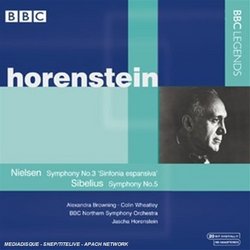| All Artists: Carl Nielsen, Recorded Sound, Jean Sibelius, Jascha Horenstein, BBC Northern Symphony Orchestra Title: Nielsen: Symphony No. 3 "Sinfonia espansiva"; Sibelius: Symphony No. 5 Members Wishing: 0 Total Copies: 0 Label: BBC Legends Original Release Date: 1/1/2009 Re-Release Date: 2/24/2009 Genres: Special Interest, Classical Styles: Historical Periods, Modern, 20th, & 21st Century, Symphonies Number of Discs: 1 SwapaCD Credits: 1 UPC: 684911424928 |
Search - Carl Nielsen, Recorded Sound, Jean Sibelius :: Nielsen: Symphony No. 3 "Sinfonia espansiva"; Sibelius: Symphony No. 5
 | Carl Nielsen, Recorded Sound, Jean Sibelius Nielsen: Symphony No. 3 "Sinfonia espansiva"; Sibelius: Symphony No. 5 Genres: Special Interest, Classical |
Larger Image |
CD Details |
CD ReviewsCompelling Interpretations; Uneven Orchestral Playing Johannes Climacus | Beverly, Massachusetts | 04/28/2009 (5 out of 5 stars) "This is an indispensable release for Horenstein admirers, particularly since he made no commercial recordings of either work. Indeed, this CD would be mandatory acquisition even if the performances represented conductor and orchestra at less than their best. But the great news is that in nearly every respect this Nielsen *Espansiva* and Sibelius Fifth represent Horenstein at the peak of his powers. Though the BBC Northern Symphony Orchestra (with which he often collaborated for concerts and broadcasts) is by no means a world-class ensemble, Horenstein somehow manages to galvanize them on this occasion so that they play as if their lives depended on it.
Horenstein's interpretation of Nielsen's *Espansiva* is distinctive, and deeply communicative, as we might expect from this veteran advocate of the composer. Whereas most conductors treat this work as a euphoric free-for-all, and the Andante Pastorale, in particular, as a rather humid tour through prelapsarian Eden, Horenstein reveals its often striking modernism--its angular contrasts of mood and idiom, its often subversive, Mahlerian sense of irony (as Joel Lazar points out in is insightful notes). Nor can there be any question that the slow movement more than hints at trouble in paradise (and not only because the wordless soprano soloist can't seem to find or maintain her pitch!). Another strength of this performance is Horenstein's unerring sense of tempo--neither too hasty (in the Allegro Espansivo) nor too leisurely (in the slow movement and finale). All told, a tremendous success; one of the most riveting accounts of this score I have ever heard. The Sibelius is no less distinctive. Predictably, Horenstein eschews the usual hazy atmosphere in the opening segment of the first movement, opting instead for maximal clarity and a tough, sinewy texture that readily conveys a sense of impending conflict. The rustic intermezzo that serves as the second movement is pointed, precise and balletic, without a hint of schmaltz. Nor are there any false heroics in the finale, which proceeds inexorably toward its shattering conclusion. Throughout, I was struck with the seriousness of Horenstein's conception, which brings this work at times unusually and unsettlingly close to the mood of the Fourth Symphony. Horenstein clearly understand that in Sibelius there are intimations of mortality, even when the composer is in a relatively "expansive" mood. A tremendous performance, this: Horenstein doesn't just direct--he ignites the ensemble, and their blazing intensity is fittingly greeted with rapturous applause at the conclusion. But perhaps BBC Music saved the best for last, in the form of a brief but ineffably poignant tribute to Horenstein by Robert Simpson on the occasion of the conductor's death. This eulogy is particularly appropriate as a postscript, given that Simpson was a close friend of Horenstein's and author of a near-definitive study of Nielsen, The appropriateness goes deeper, however. I wonder whether the producers of this release intended listeners to make the correlation between Horenstein's "modernistic" way of hearing Nielsen and the music of Simpson himself. Horenstein made a fine recording (indeed the first) of Simpson's Third Symphony, and one can only speculate to what extent his interpretation of Nielsen's Third was influenced by the British composer's assimilation of Nielsonian gestures to a far more dissonant and conflictual musical idiom. All speculation aside, I would urge collectors of historic performances, lovers of either composer, and devotees of Horenstein to acquire this CD. The broadcast recordings, though monaural, convey greater amplitude and clarity than one might have expected. One can listen to these outstanding performances with a minimum of acoustic discomfort. And that perhaps is the best news of all. Postscript: Since I wrote this review several days ago, I have had the occasion to read a mostly negative review of this recording in the most recent issue of *Gramophone* magazine. I returned to the CD for another, and more careful, listen, and am still convinced that these two performances represent the conductor at the height of his considerable powers. The *Gramophone* reviewer had nothing good to say about the orchestral playing, and while one can hear certain deficiencies (the brass, in particular, have some shaky moments), they are of little account given the blazing intensity Horenstein elicits in both works from this less than ideally honed ensemble." |
